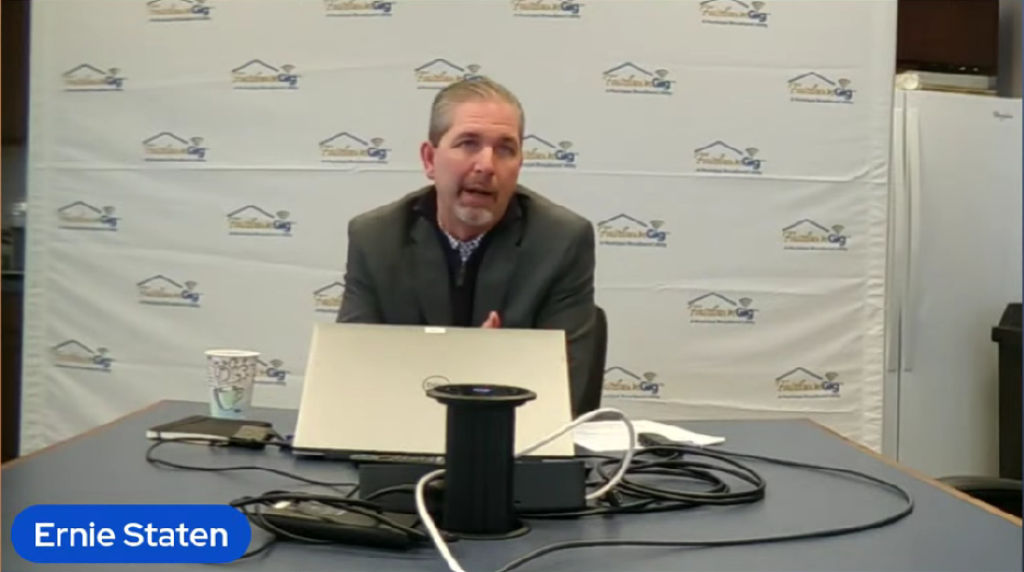Vermont, Ohio Networks Prove Municipal Broadband Pays for Itself
A grassroots effort to bring broadband to rural Vermont now boasts more than $1 billion a year in revenue.
Jericho Casper

Feb. 22, 2025 – Cities and towns were proving that municipal broadband networks can pay for themselves – without raising taxes, without government bailouts, and without private investment.
That was the message from advocates for these networks, at a webinar hosted Thursday by the Institute for Local Self-Reliance’s Community Broadband Networks Initiative and the American Association for Public Broadband, during which local broadband officials and financial experts discussed how to advance municipal networks without burdening taxpayers.
Amid an ongoing narrative that municipal broadband was too risky, too costly, and ultimately unsustainable, success stories across the country have countered that idea.
In a major milestone, ECFiber became the first municipality to receive an S&P bond rating for a broadband project that was not backed by any taxing power. Unlike traditional municipal bonds, EC Fiber’s bonds were backed solely by subscriber revenue from a competitive, unregulated business — a key distinction that set this rating apart.
“We made financial history because we were the first municipal revenue bond to get an S&P rating without geographic exclusivity, without regulation, and without general taxing power,” said F.X. Flinn, governing board chair of ECFiber. The S&P-rated precedent should make it easier for future broadband projects to secure funding without needing tax-backed guarantees.
ECFiber: Rural broadband that defied the odds
ECFiber, a municipal network serving a coalition of 23 towns in rural East Central Vermont, started with no state or federal support. The project initially struggled in the aftermath of the 2008 financial crisis when a $90 million investment deal collapsed.
Instead of giving up when ECFiber failed to secure private financing, the organization turned to its own residents, raising $7 million from nearly 500 local investors to start construction. This grassroots investment allowed ECFiber to build its network incrementally, expanding town by town as revenues grew.
Over time, ECFiber transitioned to use municipal revenue bonds backed solely by subscriber revenues to expand. In 2023, ECFiber made history, becoming the first municipal broadband project to secure an S&P rating — proving municipal networks could be financially stable.
Today, ECFiber is financially solid, covering its $5 million in annual debt service entirely through subscriber revenue.
“The only thing that we have are the revenues from our business,” said Flinn. “We’re paying about $5 million a year in debt service, and our bonds require that we [maintain an] EBITDA (Earnings Before Interest, Taxation, Depreciation and Amortization) of 1.25 times our debt service. That means we have to show a net profit of $6.25 million every year.”
“[Right now], we're doing about $1 billion dollars a year in revenue, [about] $1 million dollars a month in revenue,” Flinn said. “Things are pretty, pretty stable.”
Fairlawn Gig: A model that pays for itself
Fairlawn, Ohio, a city of about 10,000 residents took a bold step in 2015 by launching its community broadband network, Fairlawn Gig, after private ISPs refused to invest in better connectivity.
Fairlawn decided to finance the network itself, which cost $10.1 million for the outside plant and some small data centers. “The way we decided to pay for it was unique. We considered it necessary infrastructure,” Ernie Staten, Fairlawn’s public service director, said.
The city issued general obligation bonds and paid off the yearly debt of $560,000 from its existing infrastructure budget — the same budget that funds roads, sidewalks, and utilities.
“We weren’t going to rely on the city [for funding],” said Staten. “We make enough money that we cover ourselves.”
Fairlawn boasts a 71% take rate across the city’s 4,100 total addresses. The first district that went live saw an astounding 90% adoption rate on day one.
“That take rate has really given us the ability to drive that price down per month for our users,” Staten said. The ISP recently lowered Gigabit speed internet prices from $75 to $55 per month thanks to the strong demand.
Beyond financial sustainability, Fairlawn Gig has driven tangible economic benefits, Staten said. Businesses have moved in, bringing higher payrolls and increased tax revenue to the city. And, since launching the network, annual home sale price growth has jumped from 2% to 8%, a major boost to homeowners.
Finance experts: Municipal broadband takes strategy
Laura Lewis, a municipal financial advisor on over $1 billion dollars in municipal bond transactions, emphasized that cities should not be discouraged by the complexity of financing broadband networks.
“It’s quite common that you’ll need to get pieces of the financing from different places,” Lewis, principal and co-owner of LRB Public Finance Advisors, said. “So it’s not just ‘go to the bank, get a bank loan; go to the bond market, get one bond for the whole thing.’ It’s quite difficult, and it will come from different sources that will make up the capital stack,” Lewis said.
Eric Rex, vice president at KeyBanc Capital Markets, noted that broadband projects often require a combination of both grants and bond proceeds to make the numbers work.
Rex said forthcoming projects through Golden State CONNECT Authority, a 40-member county service organization in California working to expand broadband, “will be a great example of providing internet using a mix of grants from the state, but also bond proceeds.”
“The projects couldn’t be built with just the grant dollars alone. There just isn’t enough. And they could not be financed purely with bonds, because the revenue isn’t projected to be high enough to make those debt service payments,” he explained.









Member discussion